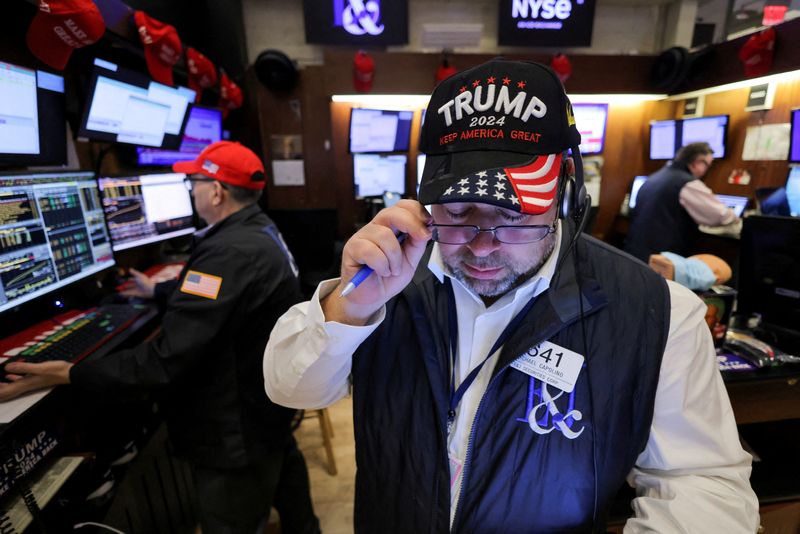By Saqib Iqbal Ahmed
NEW YORK (Reuters) – Investors are increasingly taking into account what potential Republican control of the government could mean for stocks, bonds and currencies, even as the initial feverish market reactions to Donald Trump’s presidential victory begin to subside.
A so-called red sweep scenario, in which Republicans control the White House and both houses of Congress, could pave the way for Trump to implement his economic proposals more freely. Many of these, such as tax cuts, are seen as growth-friendly, but also increase inflation risk.
Republicans held a narrow lead Friday as election officials tallied the final votes that will determine control of the U.S. House of Representatives, although Democrats managed to flip a pair of New York state seats.
“With many of Trump’s policies aimed at supporting stocks, especially small caps, markets are likely to respond well to a red sweep,” said JJ Kinahan, CEO of IG North America and president of online broker Tastetrade.
Expectations that such policies will be pushed through to some extent under Trump have helped lift the corners of the stock market, boosting the dollar and weighing on government bonds as investors recalibrate their portfolios for stronger growth, looser regulations and the possibility of inflation concerns gripping the economy. the Federal Reserve will not cut interest rates too deeply next year.
One notable move was in small-cap stocks, with the index up about 8% this week.
While some of these moves have lost momentum in recent days, investors are still puzzling over how Trump’s policies could impact markets and the economy in the long term, especially in a red sweep scenario.
Trump has promised to eliminate federal regulations that he says limit job creation. He has pledged to preserve a 2017 tax cut he signed while in office, and Trump’s economic team has discussed a new round of individual and corporate tax cuts in addition to those made during his first term.
Strategists at Goldman Sachs said their earnings per share estimates would rise by about 4% if Trump were to cut the statutory domestic corporate tax rate from 21% to 15%.
Deutsche Bank (ETR:) Analysts said they would raise their 2025 US growth forecast from 2.2% to 2.5-2.75% in the event of a red sweep. However, they expect to lower their growth forecast for 2026 in anticipation of the economic uncertainty associated with an intensifying trade war.
Republican control of the government could also provide a longer-term boost for the dollar, which has already risen to a four-month high against a basket of its peers following a post-election surge this week.
Strategists at JP Morgan see the euro falling to $1.00-$1.02, a decline of around 6% from current levels, if a sweep occurs, as opposed to falling to $1.05 in the event of a divided Congress.
History could also be on the side of continued strong stock performance if a red sweep comes.
The S&P 500 rose an average of 9.1% in years of such unified control, versus an average annual return of 6.7% for a divided government, in which the opposing party controls at least one of the Senate or House of Representatives , according to an Evercore ISI analysis of data since 1928. The index is up 26% this year, reaching 6,000 points for the first time ever on Friday.

To be fair, even with the Republican majority in Congress, some investors believe that the tight margins in both the House of Representatives and the Senate could still pose challenges in passing fiscal and regulatory changes.
“We may not get everything that was promised. The discussion on the campaign trail is always very different from the legislation that is passed,” said Paul Nolte, senior wealth advisor and market strategist at Murphy & Sylvest. “I think a lot of that is already reflected in stock prices.”


